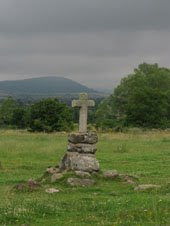These things are different in Spain:
- People don´t say "hello" as a new arrival enters a shop or bar.



- Village streets are of concrete, rapid to lay and cheap.
- We can´t communicate.

- In villages and old town centres you can´t see a shop or bar until you are upon it: no new plate glass and neon here. If it´s in the long, closed hours of the afternoon, all you´ll see (or walk right past) are the closed shutters of what might be a barn door.

- Spanish people are fatter than French people: No, that´s not right. There are thin Spanish people. But a lot of Spanish people are a lot fatter.
- Breakfast can contain a tower of freshly friend donuts dipped into melted chocolate. Or toasted bread spread with olive oil and salt. See above.

- There are thousands of adverts on TV, most of them while you´re waiting for the weather forecast.

- Fresh-pressed orange juice is everywhere.
- Drinks are cheaper.
- Set menus, especially if aimed at pilgrims, are pretty industrial-tasting.
- Double beds are rare.
- Everything happens late.

- The idea of savoury things for breakfast is not strange.
- They´ve heard of fruit smoothies and Oil of Olay. But not Orangina.
- Even bars shut for vast hours of the afternoon.
- Children stay up late. Very late. Usually playing and screaming outside our room.
- Church clocks don´t stop chiming till midnight.
- There´s yet another computer keyboard layout to learn.





























































































